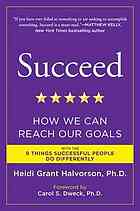
Succeed
How We Can Reach Our Goals
کتاب های مرتبط
- اطلاعات
- نقد و بررسی
- دیدگاه کاربران
نقد و بررسی

October 25, 2010
Social psychologist Halvorson, a blogger for Psychology Today and assistant professor of psychology at Lehigh University, tackles attainment of goals in every area of life from relationships to sports. Extensively reviewing past studies on self-esteem, motivation, and pursuit of goals, Halvorson sidesteps conventional notions about achieving success, particularly the idea that one should imagine oneself achieving goals easily. She cites studies by psychologist Gabriele Oettingen showing that those who think the path is difficult invest more effort and work harder: for instance, "people who believed that getting a good job after college would be easy sent out fewer applications." The ideal, Halvorson says, is to think positively about achieving one's goals but to think realistically about the effort that will be required to achieve them. Halvorson then goes on to advise readers on how to set appropriate goals, avoid obstacles, and exercise self-control to stay on track. "Don't visualize success," she warns. "Instead visualize the steps you will take in order to succeed." Despite repetitious instructions, Halvorson makes academic studies palatable by writing with clarity and interspersing personal anecdotes along the way. Many will find her insights of value.

September 15, 2010
While the purpose of both books is to help people achieve their goals, the authors take different approaches. Executive coach and trainer Fine, writing with Merrill (coauthor, The Speed of Trust), offers the GROW (Goal, Reality, Options, Way Forward) system to help readers unblock "Faith, Fire, and Focus." Simply put, he works from an inside-out system to help readers get rid of the many distractions that prevent performance and creativity. Fine is definitely on to something, and his teaching can help employers better motivate their staff as well as assist coaches to help students succeed. If one can get past the overuse of acronyms, there is solid advice to be found. Halvorson (psychology, Lehigh Univ.) holds that an individual's mode of thinking (the abstract whys and concrete whats) can help or hinder achievement of goals. She points out that different strategies are needed for different types of goals of prevention and promotion. Most of the book concentrates on examining and setting goals, and concrete suggestions are offered for staying on course. Halvorson, similar to Fine, devotes a chapter to helping the reader help others. Both books offer quality material. Fine's is more achievement oriented, while Halvorson's would be helpful in that regard as well as in kicking a bad habit.
Copyright 2010 Library Journal, LLC Used with permission.

























دیدگاه کاربران